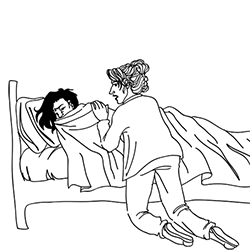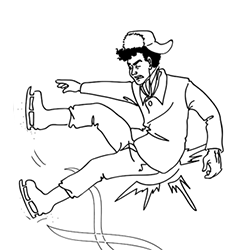Немно́го о языке́ 9.1 Что у тебя́ боли́т?
Как ты себя́ чу́вствуешь?
The verb phrase used in this question and the response to it is чу́вствовать себя́. There are several tricky things about this phrase. First, the verb чу́вствовать is a first conjugation verb with the –ова-ть suffix, meaning that its stem is: чу́вствуй- and it will conjugate like фотографи́ровать and сове́товать. Second, the first в in the verb is silent (a very rare thing in Russian) and so the verb form is pronounced as [чу́ствую]. Third, the verb has to be followed with the direct object себя́ (oneself) and an adverb to indicate how the person feels. The pronoun себя́ is the Russian reflexive pronoun and it simply points back to the subject; it does NOT change as we conjugate чу́вствовать with different subject pronouns.
Упражне́ние 1
Listen to these sentences and indicate the subject pronoun to match the conjusted form of чу́вствовать себя́.
The verb боле́ть
In Урок 7 you first encountered the verb боле́ть. Look at the pictures below and their captions to notice the two different meanings (and conjugation types) this verb can have.
| Ама́нда верну́лась из Москвы́. Тепе́рь она́ боле́ет. |
| Amanda returned from Moscow. Now, she is sick. 1st conjugation. Stem: боле́й- |
| Джош упа́л. Тепе́рь у него́ боли́т рука́. |
| Josh fell. Now, his arm hurts. 2nd conjugation. Stem: бол ́- |
The single Russian verb боле́ть and its perfective заболе́ть has two different meanings, each with their own separate conjugations. In this unit, you see more examples of how the two different conjugations work. The first conjugation verb with the stem in боле́й- / заболе́й- means “to be sick, to be ill, to feel under the weather.” The second conjugation verb with the stem in бол ́- / забол ́- means “to ache,” and the body part that hurts is the subject of this verb, and the person whose body part hurts is expressed with genitive case after the preposition у.
| В таку́ю пого́ду без ша́пки ты то́чно заболе́ешь. |
| In this weather, you will definitely get sick without a hat. 1st conjugation. Stem: боле́й- |
| Е́сли ты бу́дешь так ходи́ть, но́ги у тебя́ то́чно заболя́т. |
| If you're going to walk that way, your feet are definitely going to hurt. 2nd conjugation. Stem: бол ́- |
Some additional perfective verbs
You have already worked with the imperfective verbs ложи́ться спать (to go to bed) and встава́ть (to get up). The perfective partner of ложи́ться is the verb лечь (stem: ляг- with first conjugation endings and a stem mutation like мочь). The perfective partner of встава́ть is встать (stem: вста́н- with unstressed first conjugation endings). The perfective verbs верну́ться (to return, stem: верн- ́+ся) and принести́ (to bring, stem: принес- ́) belong to the first conjugation and have stressed endings.
The conjunction что́бы
| Ка́тя принесла́ гра́дусник, что́бы поме́рить температу́ру у Ама́нды. |
| Ама́нда откры́ла рот, что́бы поме́рить температу́ру. |
| Ама́нда пошла́ в Эльдора́до (, чтобы) купи́ть электроча́йник. |
When used with an infinitive, the conjunction что́бы expresses the notion of purpose or “in order to do X.” After verbs of motion (идти́, пойти́, е́хать, пое́хать), one can leave out the conjunction что́бы before an infinitive. Since что́бы is a conjunction, it should be preceded by a comma.
На́до and не на́до
In Unit 4, you first encountered the modal word на́до (one must, it is necessary). It can be used with imperfective or perfective infinitives, depending on what the speaker wishes to emphasize. Imperfective infinitives emphasize process, repeated action, or just naming a kind of activity. Perfective infinitives emphasize accomplishing an outcome or achieving a result in a particular context.
| Imperfective | |
|---|---|
| На заня́тиях на́до говори́ть по-ру́сски. | говори́ть is imperfective, emphasizing the regular, repeated activity of speaking. |
| Тебе́ на́до пить чай с лимо́ном. | пить is imperfective, emphasizing that Amanda needs regular, repeated doses of tea. |
| Perfective | |
|---|---|
| На́до купи́ть но́вый ча́йник. | купи́ть is perfective, emphasizing the achievement: the acquisition of a teapot. |
| На́до вы́звать врача́. | вы́звать is perfective, emphasizing that on this one occasion, one should actually get a doctor to come and see the patient. |
Its negative form не на́до (it is not necessary, one need not) is usually used with imperfective infinitives. One does not want the activity to go on at all.
| Не на́до бы́ло ходи́ть под дождём. | One shouldn't have walked around in the rain. |
| Не на́до никого́ вызыва́ть. | One doesn't need to summon anyone. |




